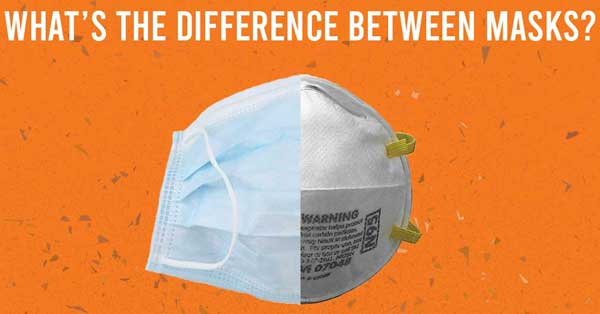It has been well-publicized that the N95 mask commonly used by healthcare professionals is in short supply. With the CDCs recent recommendation that Americans should wear a scarf or cloth mask in busy public places, it raises the question of just how effective these cloth masks are. In short, anything is better than nothing.
While the N95 mask shortage is currently on-going, with even the less effective surgical masks in short supply, a cloth mask may be the only mask you can get your hands on. So what’s the difference between these masks and how effective are they?
Know the types of particles
There are “droplet” particles and “aerosol” particles. Droplets are larger and often fall to the floor in about a minute. On the other hand, aerosolized particles come from a cough or sneeze and are much smaller and can thus hang in the air for 30 minutes to a few hours in a closed room. Understanding the difference between these particle types is key to knowing how effective your mask will be.
N95 masks
These are your best options when it comes to protection as N95 masks can filter 95% of even some of the smallest particles. It is estimated they are 91% effective in preventing airborne viral transmission. The general public can not take advantage of these effective masks due to the lack of supply with the N95s available being reserved for healthcare workers. Additionally, these masks need to have a proper “fit-test” completed to ensure they have an airtight seal.
Surgical masks
Your next best option is a surgical mask, which looks like this. These are said to be about 68% effective in preventing viral transmission if the wearer were to cough or sneeze.
Cloth/Homemade masks
We do not have much information on cloth mask effectiveness, but this is likely a case of being “better than nothing.” It’s hard to have consistent information on the effectiveness of cloth or homemade masks due to the countless differences in manufacturing.
How can I wash my mask?
Measurable amounts of virus are said to stay on the surface of a mask for several days. Washing a mask to remove this contaminant is very important and can be done easily with most masks. The N95 mask is the exception, being cleaned only using special supplies available in a medical setting.
What kind of protection do these provide?
Only N95s, assuming they are properly fitted, can protect both the wearer and others. Surgical masks work well for blocking the larger droplet particles but are only about 40% effective against the smaller aerosol particles. Thus wearing a surgical mask is primarily for stopping the wearer from spreading germs, while offering limited protection for the wearer in terms of protecting them from receiving particles.
Homemade masks are similar to surgical masks for serving primarily to protect the wearer from spreading particles. Information on effectiveness is lacking considering the limitless variables that come with these, particularly when they are hand made. However, we should assume homemade masks will not protect the wearer against the smaller aerosol particles and only droplets.
What if we all wore a mask?
The CDC recommended that all American’s wear a cloth mask to “slow the spread.” Because the cloth mask primarily helps to stop the wearer from spreading droplets, if everyone was wearing them, the spread may slow down because the masks would help prevent those who were unknowingly ill from spreading the virus.
This post uses information originally found via Dr. Peter Attia’s website


